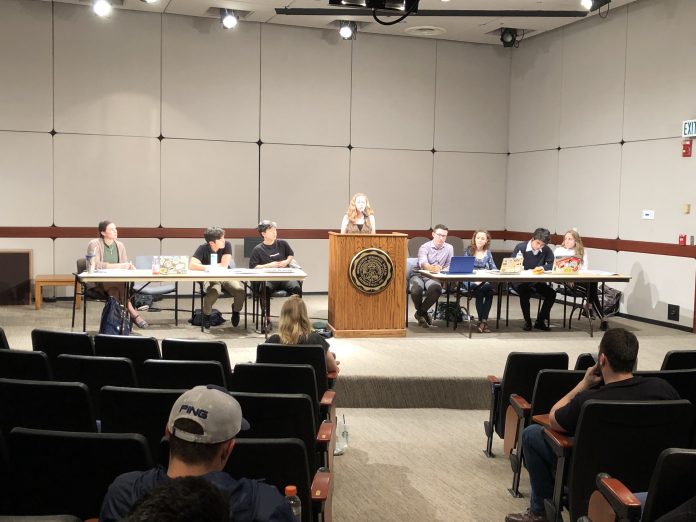
Since its establishment last year, the DePauw Gold Commitment will undergo new leadership, an updated advising process and continued implementation into DePauw’s admissions process.
The Gold Commitment guarantees job placement or an additional semester of classes for free to graduates who are not enrolled in graduate school, have not found employment or have not secured a fellowship within six months of graduation. To be eligible for the benefits of the Commitment, students must meet requirements through participating in various events and completing necessary activities each school year.
As the Gold Commitment nears the end of its first year with the Class of 2022, the university has released engagement data. Operations and Data Coordinator for the Gold Commitment program, Samantha Sarich, shared data concerning engagement with the program thus far. On average, first-year students have completed 5.98 Explore Activities as part of the Commitment, out of the twelve total to be completed by the end of their senior year; 91% have had one or more meetings with their Commitment advisor this year; 97% of first-years attended the Introduction to the Hubbard Center session in the first semester; 87% attended an internship workshop; 70% attended an exploratory fair; and 53.5% have had their resume reviewed and uploaded it to Handshake. In order to be eligible for the Gold Commitment, first-years must complete all of these requirements by the end of the year.
As the school year progressed, first-year participation in the program has declined, according to the data provided by Sarich. Sarich credits the spring semester as the reason behind the decline. “I wouldn’t necessarily call it a decrease. The spring semester is just always different for students. It’s a bit of a busier time,” Sarich said.
Students who have not completed their necessary requirements for the Commitment still have a chance to do so. “There’s not really a cut off,” said Sarich. “Up until finals week, students can still be completing these things.”
Cara Setchell, the current first-year class dean, will be overseeing both the Hubbard Center for Student Engagement and the entire Gold Commitment as of July 1, 2019.
Setchell has multiple ideas going forward in her position within the Gold Commitment. She plans to look at the current advising structure to ensure there are a sufficient number of advisors supplemented by an effective advising process. Additionally, she plans to further develop the professional programming pathway, which for first-years includes an introduction to the Hubbard Center, an internship workshop, exploratory fairs and a resume review by Hubbard Center staff.
Despite any changes made to the Gold Commitment, it will continue to remain an optional program for students, according to Setchell.“The intention is to keep it as a program that tries to help cohere the curriculum and the co-curriculum for students, but that is not a graduation requirement,” Setchell said.
Amanda Ryan, director of admissions, said there is a marketing and communications campaign for the admissions team that is specifically related to the Commitment. Information about the Gold Commitment can be found in several publications, postcards, informational booklets and digital advertisements, she added.
Ryan believes the Commitment extends beyond the post-graduation guarantee and wants prospective students to know that, “when you come to DePauw and you choose to spend your time, your money and your energy here, we have your back and we are committed to you, the student.”
Current first-year Christian Bradford said that he has attended every required event for the Commitment. He did this as a precautionary measure in case he may need to utilize the post-graduation benefits of the Commitment.
“I don’t know how serious the Gold Commitment is,” Bradford said. “I don’t want it to be important and then I miss an event and then I can’t get the Commitment when I graduate. But as far as right now, I don’t really see the importance of it.” Bradford worries that the post-graduation guarantee may not actually work and is unsure how the potential job placement aspect of the guarantee will be fulfilled.
First-year Yuki Harata has attended all required events for first-years. Upon learning that the participation in the Commitment program was not a graduation requirement, he has decided to opt out of attending Commitment related events and fulfilling all of the requirements to receive the Commitment benefits. “If I think the event is beneficial to me I will definitely go to the event. To widen my perspective, or gain knowledge or a better understanding of something,” said Harata.
Harata says he will attend Commitment related events if he sees them being beneficial to him academically or personally, but he does not intend to fulfill all of the requirements for the Gold Commitment.
The Commitment offers a program with a unique, first of its kind guarantee, said Ryan. “We’re the first university out there to offer the guarantee part of it,” she said. “We guarantee that you will have a job, or you will be in graduate school, or be in a fellowship within six months of graduation. And if you don’t and you’ve done everything that we’ve asked you to do, we’re going to take care of you.”
